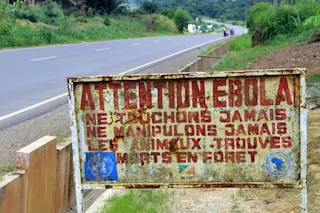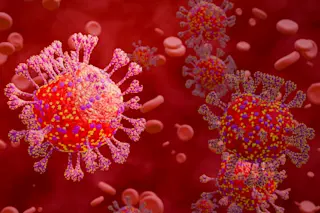A defining feature of this Ebola epidemic has been the significant resistance of some of the affected communities to treatment and prevention measures by foreign aid workers and their own governments. Many local people, suspicious and fearful, have refused to go to treatment centers or turn over bodies for safe burial, and whole communities have prohibited the entry of doctors and health teams.
As the months have gone by that resistance has been less reported upon, and there are signs that it may be lessening. In the Forest Region of Guinea, where the Ebola epidemic started, foreign staff previously faced roadblocks, stone-throwing and violent attacks. But in the last few weeks, as the New York Times has reported, locals have opened up the literal and figurative barricades around their villages and sought outside help.
Still, the friction continues to shape the spread of the disease. Doctors Without Borders’ December briefing paper [pdf] calls the situation in Guinea “alarming,” with 25 percent more cases reported in November than October and many areas where there is “still a great deal of resistance towards Ebola response” and their teams are “not welcome.”
The solution, some say, is to reevaluate treatment and prevention tactics with the benefit of an anthropological perspective. That was the call delivered last week by a meeting of the American Anthropological Association in Washington D.C. If international staff had approached the epidemic from day one with more understanding of cultural, historical and political context, attendees said, local traditions and community leaders could have become assets rather than obstacles in the fight against Ebola.
The American Anthropological Association is asking for anthropologists to become more involved in the global Ebola response. They have started the Ebola Emergency Response Initiative to connect anthropologists who are already working in or experienced with West Africa, and to build structures and programs that help more anthropologists spend time directly involved in the Ebola response on the ground.
“We’ve worked in these places and we’re watching our friends die,” said University of Florida professor Sharon Abramowitz, one of the founders of the initiative.
Abramowitz points out that the anthropologists involved in the initiative have a total of 300 years of ethnographic experience in the affected West African nations – experience which could help medical scientists both understand and respond to the epidemic.
Cultural Ambassadors
The U.S. Centers for Disease Control and Prevention (CDC) has had two medical anthropologists on the ground in Liberia since early November, and the CDC is working on bringing more anthropologists to the region, though the agency does not yet have anthropologists in Sierra Leone or Guinea.
“We’re trained to look at things in a different way” than other scientists are, said Denise Roth Allen, one of the CDC anthropologists in Liberia. “Anthropology is about a holistic approach.”
Embedded with burial and health teams, Allen and CDC anthropologist Romel Lacson said they have observed significant resistance and anger from locals. Allen stressed that much of the community resistance is not related to indigenous traditions or “strange customs” but basic issues like people seeing family members taken away and never getting news about where they end up or how they are doing.
“Anyone in the world would have these reactions, regardless of what they believe about traditional medicine,” she said.
A larger contingent of anthropologists could do even more on the ground in West Africa. They could advise health teams, especially foreign ones, on how to interact with locals and develop culturally appropriate and effective Ebola treatment and prevention plans. They could help with contact tracing – finding out who an infected person has been in touch with, especially in situations where locals are reluctant to cooperate. And they could help collect and understand data.
“Epidemiologists are making oversimplified assumptions about transmission, setting these wild upper limit bounds,” said American Anthropological Association executive director Edward Liebow. “We’re in a position to actually breathe life into the numbers, to put people into those positions, to make much more realistic assessments of near-term and longer-term predictions.”
For instance, anthropologists’ understanding of things like upcoming seasonal migrations to harvest rice could help in predicting the spread of Ebola beyond what epidemiological models will show.
Learning From the Past
Of course, this outbreak isn’t the first where anthropological knowledge has been applied. Barry Hewlett, a professor at Washington State University Vancouver, worked on the ground with the World Health Organization in Central Africa’s past Ebola epidemics and co-authored a book with his wife about indigenous responses to Ebola.
The book, published in 2007, offered recommendations for foreign health care workers interacting with residents. But he felt the advice largely fell on deaf ears this time around.
“I was surprised there wasn’t a little more attention to cultural, behavioral, social and political issues based on all the other outbreaks that have taken place,” Hewlett said. “Most of the issues that have developed here – people turning to so-called traditional medicine or witchcraft, people attacking the isolation units – all of these things have happened in previous outbreaks. Local people generally have a basic distrust of white, international outsiders because of the history of outsiders in sub-Saharan Africa, which is often exploitive and very problematic.”
Changing Tactics
After missteps early in the epidemic, medical teams have made it a priority to educate locals about the importance of safe burials, while still trying to respect traditional burial practices and beliefs about the dead. But there are other important areas where anthropologists say international staff have failed to adequately consider the cultural context.
One is the issue of stigma within communities. The stigma attached to Ebola can drive families to hide their sick and dead and refuse help from aid workers.
“It’s one thing to be stigmatized here [in the U.S.] – but when everything in this part of the world is so atomized, your whole survival is dependent on your network of social relations,” said Hewlett, who was not at the Washington D.C. conference. “If you are stigmatized in these communities your world falls apart. The costs are enormous for someone to be associated with Ebola.”
Enlisting Ebola survivors in outreach efforts is one way to combat stigma, and to show residents that accepting treatment is not a death sentence, anthropologists note.
Another priority is reducing the feeling of militarization around the Ebola response. Especially in countries with painful recent histories of civil war, the involvement of military or police automatically provokes fear and hostility. The American Anthropological Association’s recommendations even include scrapping the terminology of a “war” or “battle” against Ebola.
“In Sierra Leone there has been a militarization of burial teams where police forces and military are being sent in with burial teams,” said Abramowitz. “People are seeing a police force that they already don’t trust, already see as corrupt, taking away the body of their grandma.”
Anthropologists think they can help negotiate and explain relationships between locals, African government officials and foreign workers who are forced to work within the government system.
Meanwhile the anthropologists are also learning to shift their traditional ways of operating.
“Anthropologists normally work on a long time frame, this was a new way of working for us,” said American University professor Susan Shepler, who was in Sierra Leone in July and August. “To think about what we can do immediately.”














